Born in the rice fields of Thai Binh but working in Quang Ninh, poet Trinh Cong Loc focused his writings on the main themes of the sea and islands. In the end, he returned to his beloved bamboo and stubble banks.
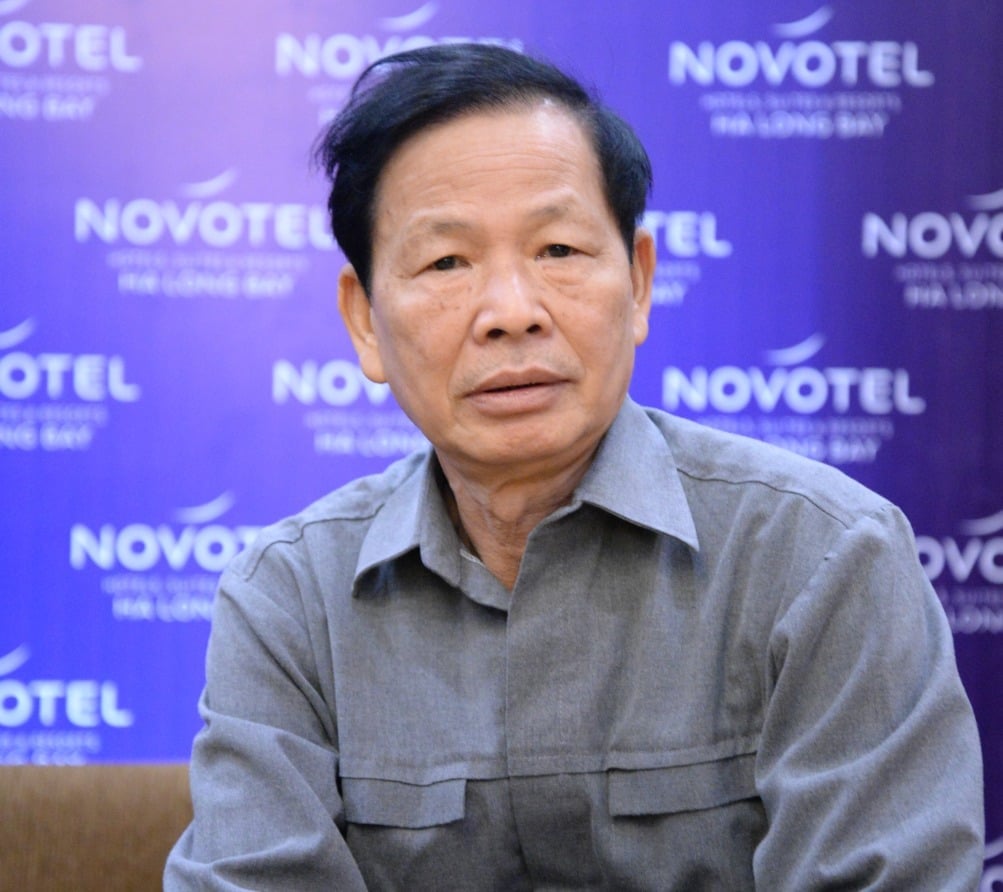
Poet Trinh Cong Loc was born on June 5, 1952 in Hoa Lu commune, Dong Hung district, Thai Binh province, but spent almost his entire life in Quang Ninh . It can be said that the poetic legacy he has is mainly in the Northeastern region of the Fatherland.
Trinh Cong Loc belonged to the generation of poets who matured during the anti-American resistance war. Therefore, while still studying at Hanoi Pedagogical University, the literature student was exposed to revolutionary literature. He was the one who initiated the establishment of the Poetry Club of the Faculty of Literature of Hanoi Pedagogical University to exchange with the Poetry Club of the General University, and to exchange poetry with young writers of the Vietnam Writers Association.
Since his time as a student of Literature, Trinh Cong Loc had his poems published in several central and local newspapers. His poem “Brown Sail” was published in the Literature and Arts newspaper and attracted the attention of many young readers at that time. Poet Trinh Cong Loc always believed that poetry had magic. And in his youth, it seemed that magic had almost completely permeated his mind.
After graduating from university, Trinh Cong Loc taught in Dong Trieu, then Uong Bi. After that, he worked as Deputy Head of the Propaganda Department of the Dong Trieu District Party Committee, Deputy Head of the Propaganda Department of the Quang Ninh Provincial Party Committee, and then Head of the Management Board of Key Monuments of Quang Ninh Province. He took the opportunity to study for a university degree in the field of Scientific Socialism, then focused on researching, editing, and publishing books on history. However, he still could not stop being passionate about poetry.
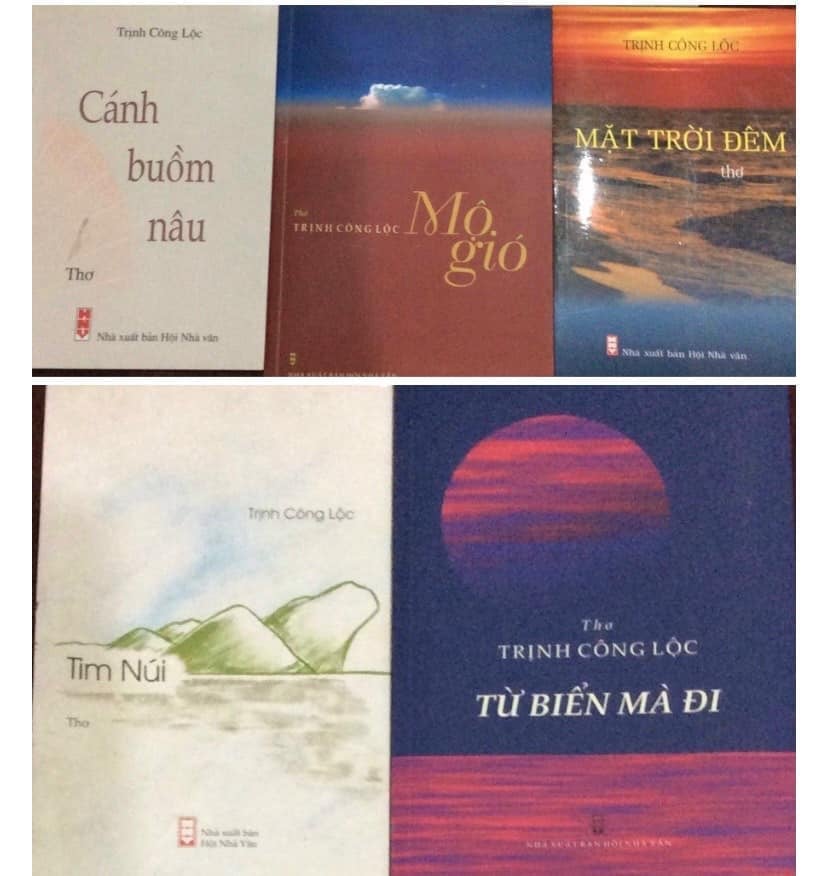
No matter what position he held, as a teacher, a propaganda officer, or a cultural worker, he was still very "loyal" to poetry. In 2011, he published his first collection of poems, "Brown Sail". A year later, in 2012, after retiring, poet Trinh Cong Loc was admitted to the Vietnam Writers Association and transferred to work at the office of the Central Council for Theory and Criticism of Literature and Arts.
His poems were published in hundreds of newspapers, even more, but it took nearly 40 years for his first collection to be released to readers. This shows that he deeply respected his readers when selecting his poems. For him, “Poetry is an excuse to share with friends, poetry is also a silken bond.”
“Brown Sail” was the first child, but “Wind Grave” was what made Trinh Cong Loc. Regarding the poem “Wind Grave”, during his lifetime, poet Trinh Cong Loc confided: “I have researched documents and images of historical wind graves. Inspiration from history and trips to islands, especially the times sleeping on the waves near the Fatherland’s border at sea, created the poetic inspiration and material for me to complete “Wind Grave”. Honestly, I am just the one who has the merit of stirring it up again.”
Talking about this poem, poet Huu Thinh, former Chairman of the Vietnam Writers Association, commented: “Trinh Cong Loc’s work is truly a poem of great scope, aiming at great values. That is the strength of the entire nation. New in perception, profound in thought, it erases all suspicion and narrow-mindedness, leaving only great sympathy: Protecting the Fatherland with the total strength of the nation”.
After that, musician Vu Thiet composed the song “Beach Song” into music, which was awarded second prize in the poetry and music contest “This is Vietnam’s Sea” in 2011. After “Wind Grave” was honored, poets and musicians wrote more about the sea and islands. Poet Dang Huy Giang, former member of the Poetry Council of the Vietnam Writers Association, said: “Trinh Cong Loc and “Wind Grave” created a social effect and created a wind grave syndrome”.
In fact, before that, Trinh Cong Loc also had many poems about the sea and islands. During his lifetime, in a conversation with the author of this article, poet Trinh Cong Loc shared: “I have spent nearly 40 years with the sea and islands of Quang Ninh and other sea and islands, my own feelings about the sea and islands have never dried up. It is from the sea and islands that I have had moments of sublimation in my writings.”
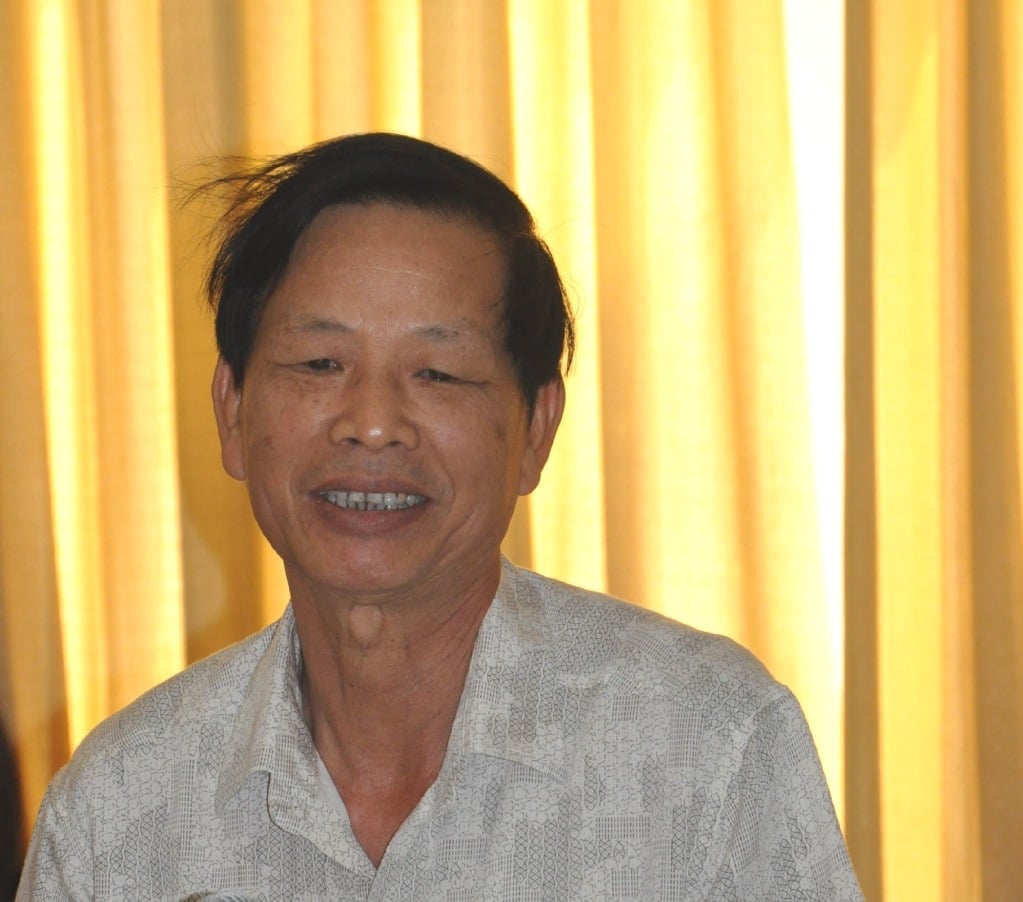
Trinh Cong Loc also had many poems about mountains, forests, and villages on the border. He wrote this poem to commemorate martyr Trinh Van Vu in Minh Chau island district: “ The season of casting nets is also the season of battle/ People who go out to sea sometimes do not return/ At those times, the whole forest of myrtle trees is bewildered/ Leaves rustle and cling tightly to the branches…/ He falls, still hugging the soldier/ Like the forest of myrtle trees holding each other! ”.
In 2020, the poetry collection “Wind Grave” and the poetry collection “From the Sea” won the First Prize, the Literature Award on Borders and Islands of the Vietnam Writers Association. Later, musician Do Hoa An also composed music for the poem “Wind Grave” by poet Trinh Cong Loc and the song “Wind Grave” along with 3 other songs helped musician Do Hoa An receive the State Prize for Literature and Arts. Poet Trinh Cong Loc also received an award from the General Department of Politics of the Vietnam People’s Army with the poetry collection “Thinking from the days of the pandemic” and “Welcoming the sun from the sea”.
Writing about the sea and islands, the inspiration in Trinh Cong Loc's poetry is a mixture of realism, romance and epic. Associate Professor Dr. Ho The Ha, former member of the Central Council for Literature and Art Theory and Criticism, commented: "It is the artist's ego and the citizen's ego through the experiences and searches from real life that create the soul of Trinh Cong Loc's poetry, both realistic and romantic; both sincere, concrete and philosophical and magical."
Writing about Quang Ninh, Trinh Cong Loc's poems have many discoveries: " The city/ Resting its head on the sea/ Ha Long/ Hair waves like clouds/ Bai Tho Mountain/ The eternal accordion tree". The poems he wrote about Ha Long Bay are very clear: "Ha Long of the fairies/ Heaven and earth cannot hide/ The sun also becomes a feeling/ Making someone's eyes confused... ".
He looked at the boat on the Bay and discovered: “ The net is spread out between our love for the sea/ The net and the boat are like a pair of lovers/ Each small island follows the mesh of the net/ Each mesh of the offshore net - the mesh of the sun! ”. These are epic verses: “ The same primitive roads up to the forest, down to the sea/ Thousands of roads have gone through times of war/ Whirling like arrows, like crossbows/ The shape of dragons and fairies swirling up… ”.
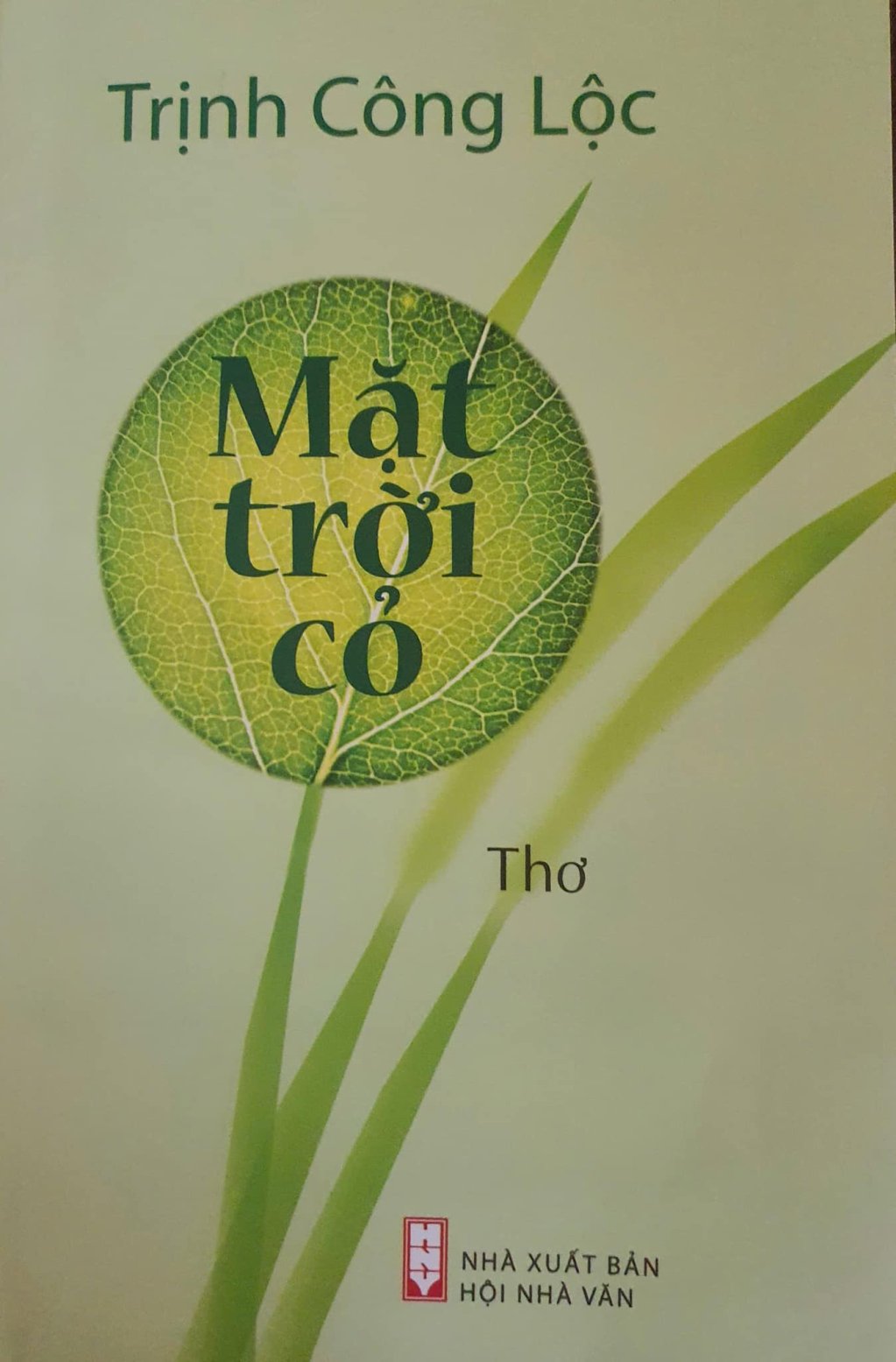
The themes of seas and islands, borders, the Fatherland, people, and national destiny are included in Trinh Cong Loc’s poetry with the writer’s sense of civic responsibility. Trinh Cong Loc is a poet who focuses on writing about seas and islands, but his poems about coal regions are also worth reading. The verses about coal are filled with anxiety. The poems “Than to bee’s nest”, “Vo ca than”, “Tuong tuong than”… are the most concrete examples. The poet sympathizes with and respects the miners: “ Than/ The only child/ Millions of years of heavy earth giving birth to pain…/ Layer upon layer of deep layers/ The great coal tree grows from the darkness… ” (Than con con mot).
Or in the poem “Treasure”: “ It’s different from the past/ Don’t pull the sun down low/ Don’t rush the carts/ Don’t change the fire to cook rice/… Each meter of the furnace/ Counts each life/ Covers the skin of a lifetime… ”. He also expressed a philosophical view: “ Coal season/ Clouds gather in the corner of the sky/ The sun pours down on Ha Tu slope/ The rain pours down and coal flows/ The open air is piled high/ The moon has become the mine’s eye/ Or has become the eye socket/ Looking for coal ” (Open air).
The miner appears in his poetry both romantically and heroically: "In song/ The moon pours gold on the ground/ The eyes of the stars are restless/ The years are hard/ Using flesh and skin to patch the sky/ Using blood and bones to patch the ground/ Sharpening hardships/ Opening coal roads for centuries ". Also because of the philosophical nature of the poetry, what poet Trinh Cong Loc wrote is quite selective of readers. Not all ordinary readers understand: " Who has lived with coal/ Hammers, hammers, seams, tunnels and gas/ The mining troops/ The black shadow of the earth/ The black shadow is also eternal.../ Coal, the biological clock/ Appears, the primeval life force/ Darkness kills darkness... ".
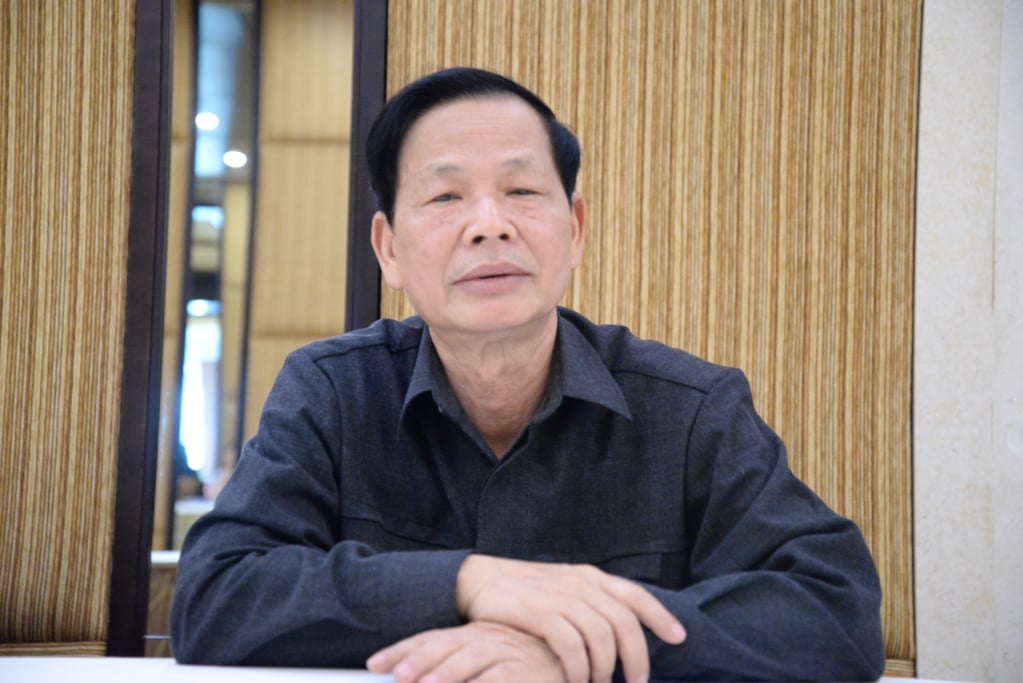
Along with the sea, poet Trinh Cong Loc also wrote many other poems about the mountains of Dong Van, Hoanh Mo, Khe Van, and Ngoa Van. In the poem “Cao Xiem”, the mountains and forests appear both majestic and romantic: “ …The sound of Ba Lanh rocks echoes in the mind/ Echoes in Khe Van/ The hair meets/ The waves rub together like ropes/ Tying the river and the mountains… ”.
After the success of “Grass Grave”, “From the Sea”, “Mountain Ring”, he continued with the collection “Grass Sun”. He was very fond of exploiting the image of the sun. There were even 2 collections of poems named after that. With the collection “Night Sun”, the national spirit was once again rekindled when he wrote about the feelings of the soldiers who sacrificed their lives… The poems in the collection “Grass Sun” were rich in contemplation and reflection, but not about worldly affairs but about oneself.
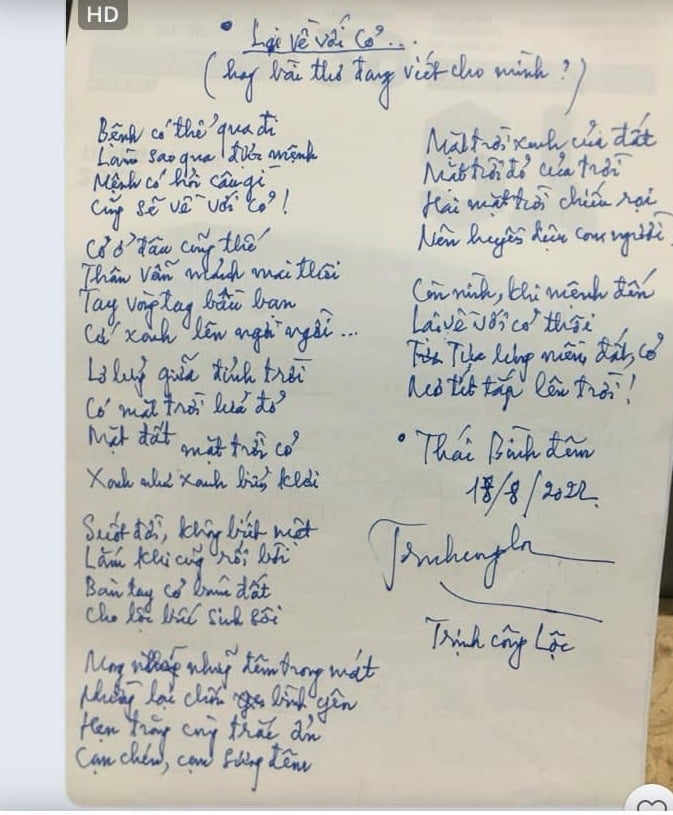
Seemingly anticipating the "final stop": "When fate comes, I will return to the grass", in the last years of his life, poet Trinh Cong Loc returned to live in his native land. It can be said that in Quang Ninh, he found a direction for his poetry when "intensively cultivating" the theme of the sea and islands. Returning to the scent of the grasslands of his beloved homeland, he wanted to find a new direction for himself, a direction to be transformed into the green color of wild grass.
Poet Trinh Cong Loc had been recovering from illness for several years in his hometown and "returned to the grass" as he said, at 3:30 p.m. on February 15, 2025, amid the condolences of many friends, colleagues and poetry lovers. "From the sea to go", tired feet then return to the source and roots, that is, return to the scent of the fields and grass. Surely in that poetic land, poet Trinh Cong Loc found his light.
Source














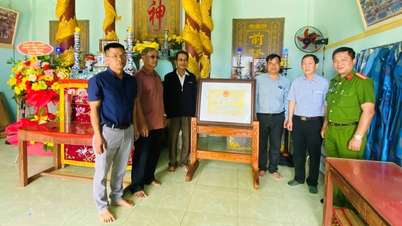











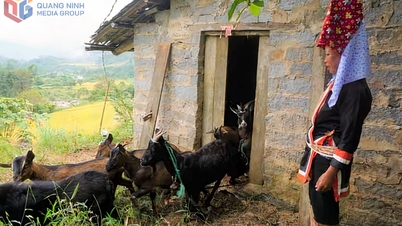





















































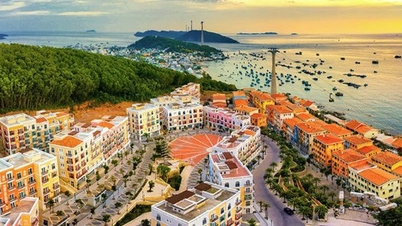













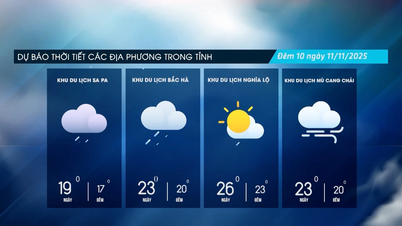




![Dong Nai OCOP transition: [Article 3] Linking tourism with OCOP product consumption](https://vphoto.vietnam.vn/thumb/402x226/vietnam/resource/IMAGE/2025/11/10/1762739199309_1324-2740-7_n-162543_981.jpeg)













Comment (0)